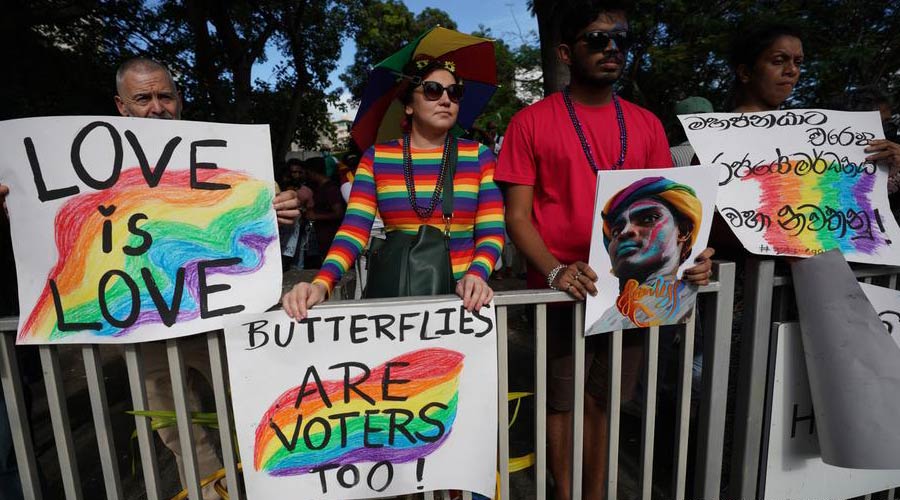When Jude Rameshkanth, 28, a hospitality employee working overseas, returned home to his family in eastern Sri Lanka this January, his father organized an arranged marriagefor him with a woman. But Rameshkanth repeatedly explained to his family that he identifies himself as gay, and so has no interest in marrying a woman. His family continued to pressure him to enter a heterosexual marriage.
"My brother told me that if I do not get married, his life will also be spoiled. [Late next day] I [escaped] from home, and took the bus to Colombo," Rameshkanth told DW.
Although he escaped a forced marriage, Rameshkanth now feels estranged from his family and is planning to migrate because he feels that he does not "belong" in Sri Lanka.
"I am sad about not getting to meet the family during the [recent] church festival and new year celebrations," he said.
'State-sponsored rape'
Same-sex relationships in Sri Lanka are still criminalized under a number of laws stemming from British colonial times, which allow "offenders" to be imprisoned for up to 10 years.
Sections 365 and 365 A of the penal code, for instance, criminalize both "carnal intercourse against the order of nature, with any man, woman and animal," and "acts of gross indecency."
Aritha Wickramasinghe, a lawyer and equality director at iProbono, a Sri Lankan organization providing free legal services, says that while "carnal intercourse against the order of nature" broadly applies to all kinds of sexual activity with no reproductive nature, it has largely been used to target homosexual and bisexual people.
"It has made every LGBTQ+ person a potential criminal under the law," Wickramasinghe said. The police, he says, have extensively used these laws to harass, intimidate, arrest, and prosecute individuals.
Wickramasinghe recalls a case his organization handled about two years ago, where three gay men were arrested for having a meal together in a hotel room, because the receptionist thought their behavior was suspicious. This is "stereotyping" LGBTQ+ people, Wickramasinghe says.
According to the lawyer, in all the cases handled by iProbono, "suspected" LGBTQ+ people were subjected to forced anal and vaginal examinations by so-called judicial medical officers.
"This is state sponsored rape," Wickramasinghe said. "It is a sexual perversion."
LGBTQ+ community subject to 'discrimination, abuse'
For over a decade, Sri Lankan activists have attempted to decriminalize same-sex relationships. Rising international pressure has also prompted Sri Lanka to reconsider its same-sex relationship laws.
Earlier this year, the government has indicated support for a private members bill in parliament.
Ali Sabry, the country's foreign affairs minister, has told local media that while the government will "support" decriminalization of same-sex relationships, they will not be legalized.
In 2022, a decision by the UN Committee on the Elimination of Discrimination Against Women (CEDAW) recognized that the existing laws violated the rights of Rosanna Flamer-Caldera, a lesbian activist and executive director of Equal Grounds, a Sri Lankan organization advocating for LGBTQ+ rights.
The European Parliament also recognized the decision this week and called for universal decriminalization of homosexuality and transgender identity.
Flamer-Caldera told DW that Sri Lanka's colonial-era laws have cut off the LGBTQ+ community from every aspect of life heterosexual people take for granted, including education, health care, family life and social services. According to Flamer-Caldera, the country's laws subject the community to "discrimination, marginalization, violence and abuse."
"Forced heterosexual marriages are very, very prevalent, not just for lesbian and bisexual women, but also for gay men and bisexual men," she said, adding that this forces some individuals to lead a "double life."
Calls for the laws to be repealed
Flamer-Caldera wants to have the laws repealed rather than amended, to avoid any open interpretations.
Last week, a number of private parties filed a petition in the Supreme Court of Sri Lanka, challenging the constitutionality of the bill to decriminalize homosexuality, and expressing concerns that it puts children at risk. Wickramasinghe maintains these concerns remain groundless.
Speaking about the attempts to decriminalize same-sex relations in Sri Lanka, Deprose Muchena, senior director of Human Rights Impact at Amnesty International, told DW the global rights group "is expecting the Sri Lankan leadership to have the courage and the ability to do the right thing at the right time, for the right reasons. And that time is now…"











